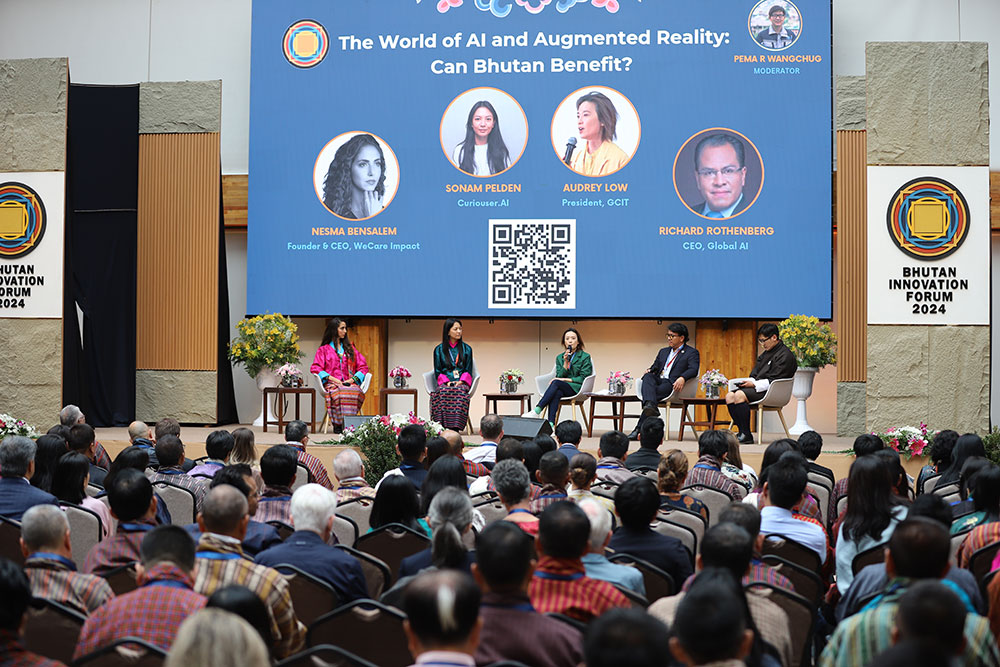KP Sharma
Paro—As the world transitions into a data-driven future, Bhutan is taking a unique approach to artificial intelligence (AI) and augmented reality (AR) by focusing on ethics and cultural values.
At the Bhutan Innovation Forum (BIF), which concluded on October 3, experts from around the world gathered at the historic Dungkar Dzong in Paro to discuss the transformative potential of these technologies across various sectors and the need for governance frameworks that prioritises citizen well-being.
Central to Bhutan’s strategy is its commitment to Gross National Happiness (GNH), which connects economic development with cultural preservation and societal health. This principle guides the country’s aspirations to build a robust digital economy.
By integrating AI and AR, Bhutan aims to enhance efficiency and personalised services in critical areas such as healthcare, education, agriculture, and tourism, all while celebrating its rich cultural heritage.
However, the rise of AI and AR also brings challenges, including concerns over data privacy, digital identity protection, and risks like deepfakes and identity theft.
Sonam Pelden, emphasised the importance of understanding the long-term effects of AI.
While acknowledging the benefits that AI can bring, she cautioned against becoming too dependent on technology, which could weaken human creativity and problem-solving skills.
“We have to ask ourselves: If we design all our decision-making processes around AI, then what are we doing for ourselves? The next generation could be worse off,” she said.
She suggested keeping human intelligence strong alongside AI development, stating that if humans provide AI with data infused with Buddhist values, Bhutan will have a future to look forward to.
The founder and CEO of WeCare Impact, Nesma Bensalem, echoed similar views regarding ethical responsibilities tied to AI’s data-driven nature. “AI is a data aggregator. While it has huge potential, gathering massive data on individual identities poses a significant risk and it is crucial to think about how to use data wisely and responsibly,” she said.
Nesma Bensalem called for collaboration between public and private sectors to encourage innovation while maintaining ethical standards.
She mentioned ‘Climate GPT’, an AI model trained on environmental data, as an example of how technology can bring positive change. “By feeding AI with data that aligns with values like sustainability, we can optimise decision-making for a better future,” she said.
Nesma Bensalem urged Bhutan to use its unique perspective to shape global discussions on AI.
“This is a fascinating opportunity to offer something unique to the world.”
Bhutan has a lot to contribute in terms of mindfulness, compassion, and sustainability, she added.
The need for strong governance was reiterated by Audrey Low, President of Gyalpozhing College of Information Technology who talked about the importance of creating a centralised place for AI training data. “We need a playbook to ensure that the data we use leads to informed, ethical decisions. This playbook would help industries, from airlines to banking, operate more efficiently while maintaining ethical standards.”
The CEO of Global AI, Richard Rothenberg, said that Bhutan can be a potential hub for ethical AI, particularly with the country’s focus on GNH and commitment to clean energy for responsible AI development.
“Bhutan has the values, the mission, and the resources like hydropower and Buddhist teachings on mindfulness that make it an ideal place to develop AI rooted in compassion and sustainability,” he explained.
He also addressed the biases prevalent in many AI models, which are often trained on data from the Global North. He advocated for the inclusion of Bhutanese literature and values in AI training.
The consensus among speakers at the Forum was that in an era where ethical technology use is under scrutiny, Bhutan’s commitment to balancing innovation with cultural integrity serves as a model for other nations to follow.


